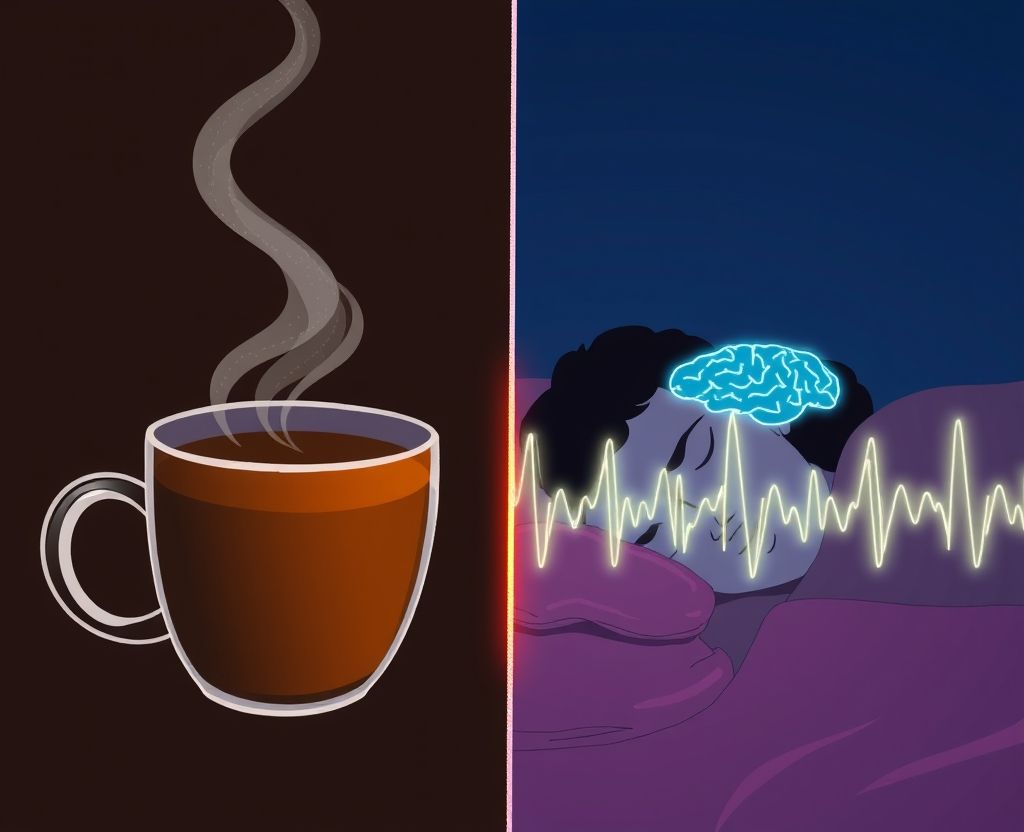
Coffee and the Sleeping Brain: New Study Reveals How Caffeine Alters Nighttime Brain Activity
A groundbreaking study reveals how just two afternoon cups of coffee can disrupt deep sleep and reshape brain activity — especially in young adults.
If you’re in the habit of enjoying coffee in the afternoon, you might want to reconsider. A recent study conducted by researchers at the University of Montréal and published in Communications Biology found that even moderate doses of caffeine after midday can significantly alter how the brain functions during sleep — particularly in the crucial non-REM stages, which are responsible for the body’s restoration.
The study goes far beyond typical sleep hygiene advice. It details, with scientific precision, how caffeine affects the structure of brain activity and highlights age-related differences in how this stimulant disrupts our sleep cycles.
Inside the Study: How It Was Conducted
The research team recruited 40 healthy adults aged between 20 and 58, all with moderate caffeine habits. Each participant spent two nights at a sleep lab under carefully controlled conditions:
-
On one night, participants consumed 200 mg of caffeine — the equivalent of about two cups of coffee.
-
On the other, they were given a placebo.
-
Neither the participants nor the researchers knew which treatment was administered on which night (a double-blind study).
During both nights, the team monitored each subject’s brain activity using electroencephalography (EEG) — a tool that captures electrical signals in the brain while sleeping.
A Hyperactive Brain During Sleep
The EEG readings revealed remarkable changes when participants consumed caffeine:
-
Brain signals were more random and complex, especially during non-REM sleep, which is the stage where deep rest and body repair typically occur.
-
Brain activity appeared to resemble a “critical state,” a condition of heightened responsiveness often seen during wakefulness.
-
Non-REM sleep became shallower, reducing the depth and effectiveness of recovery.
“Caffeine delays but does not prevent sleep,” said lead researcher Prof. Philipp Thölke. “Even though we can sleep under the influence of caffeine, the brain — and therefore also sleep — is impacted. It leads to shallower sleep with increased information processing during the sleep stages where the brain normally enters deep restorative rest.”
Younger Adults Are More Vulnerable
Interestingly, the study found that age plays a major role in how caffeine impacts sleep. Among participants:
-
Younger adults (ages 20–27) were more strongly affected during REM sleep, the stage associated with dreaming and emotional processing.
-
Older participants (ages 41–58) showed less disruption during REM, which researchers believe may be due to age-related changes in adenosine receptors — brain structures that regulate sleep pressure.
Caffeine blocks adenosine receptors, which is how it keeps us alert. Since older adults have fewer of these receptors, caffeine’s effects are somewhat blunted in this group — at least during REM sleep. However, the disruption of non-REM sleep was observed across all age groups.
Why This Matters
While caffeine is consumed daily by billions, this study highlights that even a modest amount taken after noon can significantly alter the structure and quality of sleep. Over time, this can contribute to:
-
Chronic fatigue
-
Weakened immune function
-
Impaired memory and cognitive performance
-
Increased risk of heart disease, diabetes, and mood disorders
Sleep experts have long warned that sleep is not just about duration — depth and brain rhythm are equally important, and caffeine interferes with both.
Important Caveats
-
The study was conducted exclusively on healthy adults with no diagnosed sleep disorders.
-
It may not apply to people with neurological or psychiatric conditions like Parkinson’s disease, insomnia, or anxiety.
-
Individual sensitivity to caffeine varies and may be influenced by genetics and long-term habits.
Final Takeaway: Rethinking Your Coffee Cutoff Time
So when should you stop drinking coffee? While there’s no universal answer, this study reinforces a common rule of thumb: avoid caffeine after noon if you want to ensure deeper, more restorative sleep.
You don’t need to give up coffee — but you should be mindful of when you consume it.







